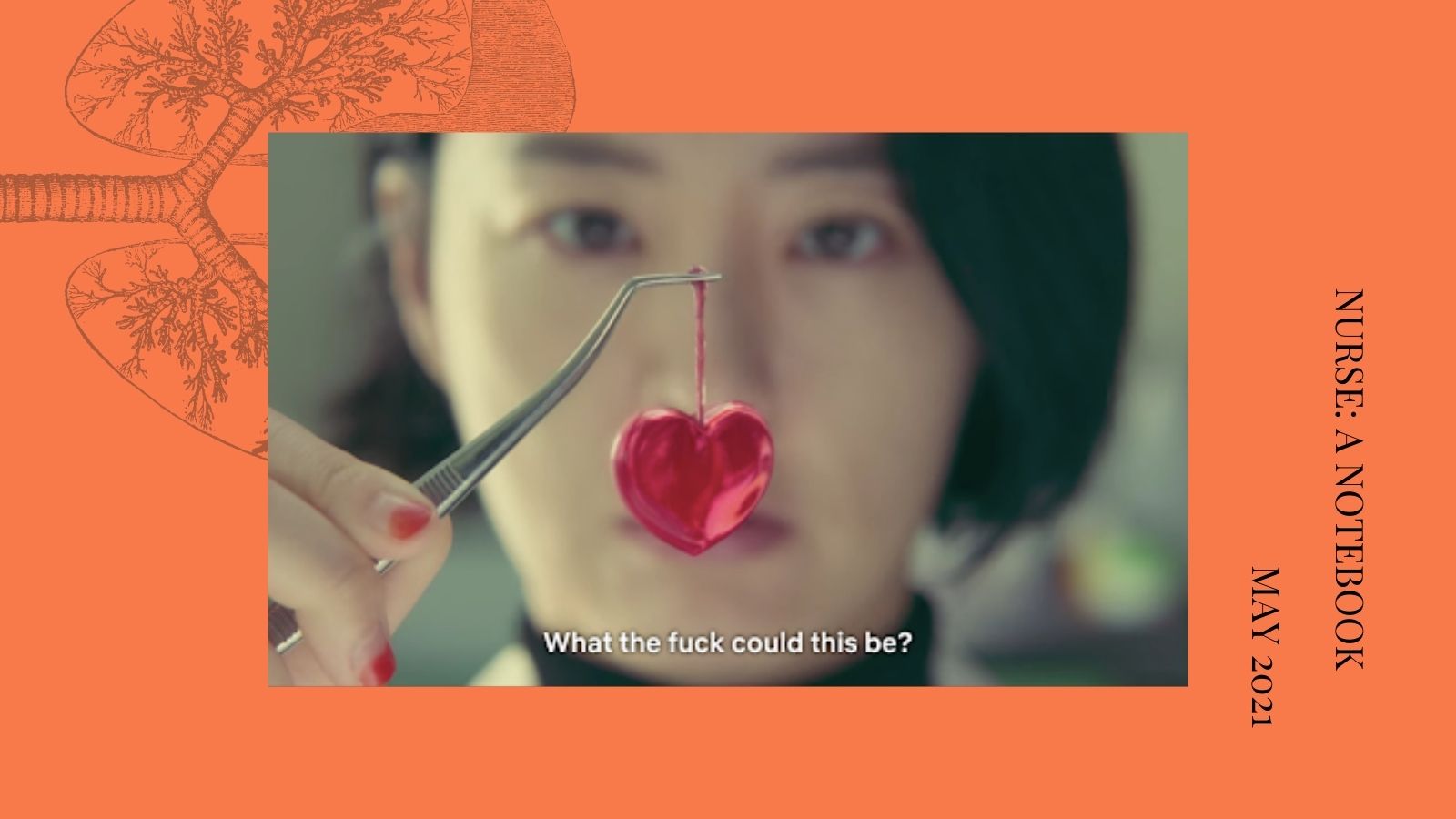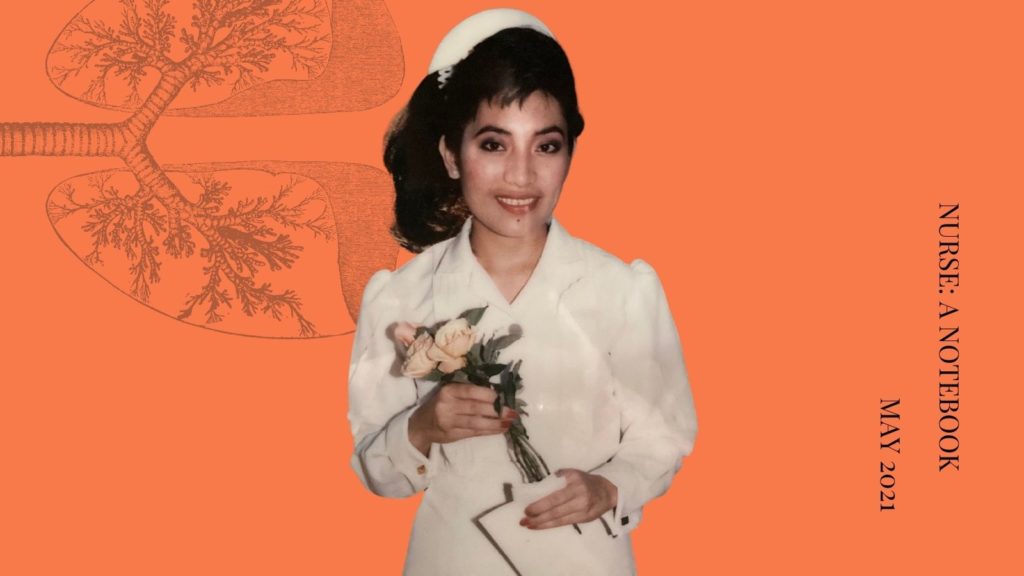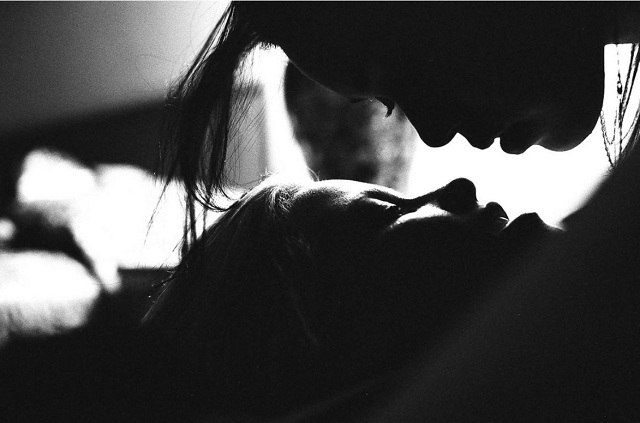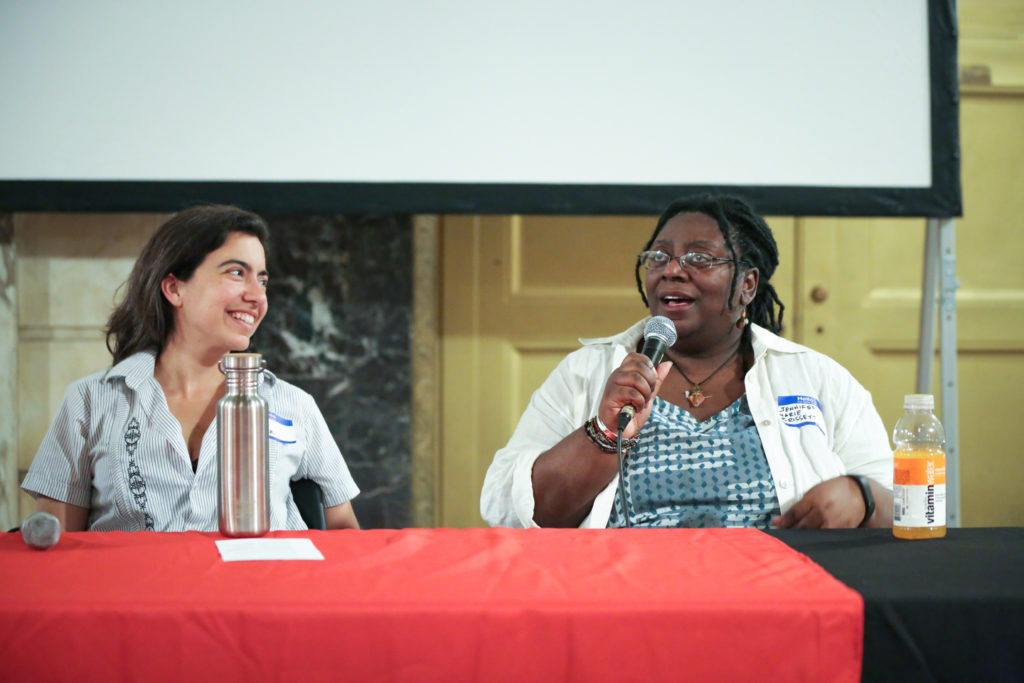Atrocities happen all too often in real life, so it’s my hope that people can be less hurt while reading my novels.

May 20, 2021
Editor’s Note: The following conversation between Serang Chung and Soje is part of a notebook of writing on the theme Nurse. Read other pieces in the collection gathered here. This conversation was conducted in Korean and translated by Soje. Read the English version here.
정세랑 작가는 독자가 뽑은 ‘2020년 한국 문학의 얼굴들’에 선정되었다. 또한 2020년 가장 많이 팔린 한국 소설 5권 중 2권은 『시선으로부터,』와 『보건교사 안은영』이었다. 『보건교사 안은영』은 이경미 감독, 정유미·남주혁 주연의 넷플릭스 오리지널 시리즈로 제작됐다. 한 마디로 정세랑 작가는 문학계 슈퍼스타이다. 트위터 계정 ‘정세랑 봇’과 「작가 덕질 아카이빙 [글리프] 1호: 정세랑 월드」 의 주인공이기도 하다.
김초엽 작가는 그를 두고 이렇게 말했다. “나는 정세랑이 그리는 세계에 살고 싶다는 생각을 자주 한다. 이상하고 신기한 일들이 자꾸 일어나는데, 세상이 무너지고 망해가는 와중에도 어딘가에는 나를 꼭 붙잡아 줄 사람들이 살고 있는 그 세계에.”
정세랑 월드라고 해서 기후 변화, 제국주의, 직장 내 성희롱, 퀴어 혐오, 학교폭력, 교과서 왜곡, 산업 재해 등 현실의 문제를 피해가지 않는다. 하지만 그 세계에서는 따뜻한 손을 건네는 사람들이 꼭 있다. 현실에서 돌봄은 여성의 몫으로 제도화 되어있고, 그래서 그 가치가 평가절하된다. 사실 ‘발랄’하고 ‘다정’하다는 수식어도 여성성과 연관 지어 사용되지만 정세랑 작가는 그것을 거부하기 보다는 긍정하고, 가치 있는 덕목임을 상기시켜 준다 .
정세랑 작가는 “세상이 내가 원하는 모습이 아닐 때, 그 때 어떻게 살아야 할 것인가”에 대한 글을 쓴다고 본인이 말했다. 그래서 내가 지금 가장 인터뷰하고 싶은 사람이었다. 더 나은 세상을 상상하기 위해. 이 세상에 살아남기 위해. 짧은 인터뷰에 너무 많은 걸 바랐지만, 난 정말로 ‘정세랑 월드’와 그의 수많은 독자들을 생각하면서 위로를 받았다. 이 세상은 이상하고 위험하니까 서로 손을 내밀어 잡아주자. 더 많은 사람들도 이런 마음이라면 계속 나아갈 수 있을 것 같다.
소제: 작가님 소설이 넷플릭스 오리지널 시리즈로 공개되면서 이제 한국의 대표 히어로는 보건교사 겸 퇴마사가 되었습니다! 제 주변에 장난감 칼과 비비탄 총으로 젤리를 물리치는 월급쟁이는 없지만, 안은영이 투덜대고 욕하면서도 자기 일을 수행하는 모습은 너무나도 친근합니다.
작가님도 무려 5년 간 낮에는 편집자로 일하고 밤에는 소설을 쓰며 고단한 투잡 생활을 하는 주인공을 떠올렸다고 밝히셨죠. 많은 직업 중에 왜 ‘보건교사’로 정하셨나요?
정세랑: 오랜 친구가 보건교사로 교생 실습을 나가 재미있는 일화들을 저에게 들려주었고, 이후 대학병원에서 일하며 또 여러 심경을 들려주어 머릿속에서 이야기가 시작되었습니다. 그 친구는 제가 아는 한 가장 이타적이고 책임감 있고 힘겨운 순간에도 유머를 잃지 않는 사람이에요. 친구의 그런 면이 간호사 선생님들에게 공통적으로 있지 않나 생각했습니다. 더한 존중과 감사를 받으셔야 한다고 믿어요.
소제: ‘보건교사’ 에 대한 이야기에 그의 치료와 돌봄을 받는 학생들을 빼놓을 수 없죠. 『보건교사 안은영』 집필 의도에 대해 “선한 어른들이 아무 대가도 원하지 않고 미성년자들을 지키는 이야기를 쓰고 싶었다”고 밝히셨습니다. 청소년에 대한 애정이 많으신 것 같아요. 특별한 이유가 있나요?
정세랑: 저 역시 사범대에서 공부했고 교사 자격증을 가지고 있어서 그런 것 같습니다. 제가 학생이었을 때 운 좋게도 멋진 선생님들을 여러 분 뵈었던 것도 이유고요. 미성년자를 보호할 좋은 어른이 더 많이 필요한데 현실은 청소년들이 위험과 착취에 몰리지 않나 경각심을 가지고 있습니다.
소제: 학교의 엄숙주의와 목 건강 때문에 교사가 되지 않으셨지만, 주변에 교사 친구들이 많다고 들었어요. (소설 내용도 팩트체크해주신다고!) 코로나 시대의 한국 학교는 어떤가요?
정세랑: 성대가 워낙 약하고, 사실 그보다는 수업을 워낙 횡설수설해서 자질이 없다는 걸 일찌감치 깨달았답니다. 교사로 일하고 있는 친구들은 여러모로 사회의 기둥이자 방파제가 아닌지 생각해요. 이제 10년차를 넘어서고들 있는데 지치지 않고 닳지 않아서 대단히 존경하고 있습니다. 현장에서 온라인 수업의 질을 높이기 위해 여러 노력을 기울이는 것을 보며 감탄했습니다. 상황이 좋지 않아도 멈추거나 포기하지 않는 모습입니다.
소제: 단편소설 「사랑해, 젤리피쉬」를 2010년 환상문학웹진 ‘거울’에 발표한 후, 댓글로 독자들의 뜨거운 성원과 장편도 써달라는 요청을 받아 2015년 옴니버스 장편소설 『보건교사 안은영』을 출간하셨습니다.
그 사이 한 참사가 한국 사회의 집단 기억에 새겨졌습니다. 2014년 4월 16일, 여객선 세월호가 전남 진도 앞바다에 침몰하면서 수학여행을 가던 안산 단원고 학생 250명을 포함해 총 304명이 죽었습니다. 학생들을 태우고2016년 촛불집회 위로 헤엄치는 고래 일러스트가 공개된 이후로 ‘고래’는 세월호 참사로 희생된 학생들이 고래를 타고 가족 곁으로 안전하게 돌아왔으면 하는 바람을 상징하게 되었습니다. 방탄소년단 ‘봄날’, 아이유 ‘이름에게’, 레드벨벳 ‘7월 7일’ 과 같은 곡들이 세월호 추모곡으로 해석되기도 하지만, 참사에 대한 직접적인 묘사는 아직 국내 예술계에서 전반적으로 조심스러워하는 것 같아요.
이경미 감독님과 함께 각본 작업을 하시고 2020년 가을에 드라마가 나왔는데, 학교 위에 헤엄치는 고래 유령을 보는 순간 한국 시청자들은 세월호를 떠올릴 수 밖에 없었을 것 같습니다. CG 고래는 누구의 아이디어였고, 국내 및 해외 반응은 어땠는지 궁금합니다.
정세랑: 고래 아이디어는 완전히 이경미 감독님의 아이디어입니다. 애틋해 하시는 분들도 계셨고 거부감을 느끼신 분들도 계셨던 것 같아요. 소설에는 직접적인 묘사가 없고 드라마에는 상징적으로 나오는데 창작자들이 계속 고민해야 할 지점인 것 같아요.
소제: 안은영의 조력자는 한문 교사 홍인표입니다. 타고난 보호막을 가진 그는 손을 맞잡아 파워를 충전해 줄 수 있습니다. (그래서 인표는 팬들 사이에 ‘보조 배터리’라고 불리죠.) 조력자를 성인 남성으로 정하고, 인표에게 후천적 장애를 주신 이유는 무엇인가요?
정세랑: 안은영이 성인이니만큼 당연히 조력자도 성인이어야 했던 것 같아요. 안은영과 성애적 관계인지 아닌지 헷갈리면 재미있는 농담이 될 것 같았고요. 그리고 미디어에서 장애가 있는 사람이 장애로만 이미지가 대표되는 게 늘 불만족스러웠어요. 사실 현실에서는 복합적인 면을 접하니까 ‘아참, 이 사람 이쪽 귀가 안 들렸지’, 혹은 ‘아참, 이야기하다보니 이 사람 다리에 대해 까맣게 잊어버렸네’ 하고 나중에야 떠오르지 않나 했거든요. 그래서 인표의 다른 매력들이 강조되고, 인표가 스스로의 장애에 대해, 또 주변인들이 인표를 대할 때 자연스럽게 받아들이는 모습을 보여주고 싶었어요. 신파 없이, 한 사람을 구성하는 다양한 요소 중에 하나로요. 후천적 사고였던 것은 미스터리를 위해서였습니다. 사고가 정말 사고였나, 의심할 수 있게요.
소제: “컵케잌 위에 크림을 올리듯이 판타지를 사용하고 싶어요”라고 말씀하신 적이 있는데, 판타지 크림이 없는 사실주의 소설 『피프티피플』이나 『시선으로부터, 』에서도 지금-여기의 세상을 있는 그대로 그리지 않고 또 다른 결말을 상상하십니다. 현실의 문제점을 짚으면서도 비극을 비껴가는 방식에 매번 감탄합니다. 그것도 일종의 돌봄으로 느껴지는데, 소설가로서의 임무라고 생각하시나요?
정세랑: 저는 판타지를 쓰지 않을 때에도 판타지 작가인 듯합니다. 현실 바로 근처에 안전한 공기층을 만드는 작업을 하지 않나 하고요. 현실에서 참혹한 일들이 너무 자주 일어나서, 소설을 읽을 때만이라도 사람들이 마음을 덜 다쳤으면 좋겠어요. 지나치게 물러 터졌다는 비판도 받는데 독자로서 제가 읽고 싶은 소설은 안전 장치가 있는 소설들이라서요. 중요한 주제를 말할 때는 스트레스의 농도를 더 잘 조절해야 하지 않나 전략적으로 고민합니다.
소제: 『지구에서 한아뿐』이 절판되고 7년 만에 개정판이 나오게 된 계기도 꽤 인상적인데요, 모르시는 분들 위해 설명해주실 수 있을까요?
정세랑: 초판이 절판되고 중고 책 시장에서 지나치게 가격이 높게 책정되는 바람에 걱정스러워서 개정판을 만들었습니다. 그런데 수집가들은 개정판이 나와도 초판을 원하시기 때문에 전혀 가격이 떨어지지 않았어요. 목표했던 바는 이루지 못했지만 그래도 개정판을 내기 잘했다고 생각합니다.
소제: 개정판에 고치신 부분들이 사소한 수정이 아니더라고요. ‘정상적인 가족’에 대한 고정관념에서 벗어나기 위해 등장인물 한 명을 지우고, 친환경적인 내용을 한층 더 친환경적인 방향으로 수정하고, 심지어 한아의 연예인 이상형도 바꾸셨어요. 등장인물은 물론, 독자를 향한 대단한 애정을 느꼈답니다.
정세랑: 저의 생각들이 몇 년 사이에 이만큼 변할 수 있었다는 게 부끄럽기도 하고 동시에 희망적이기도 해요. 한국 사회는 사람들의 생각이 변하는 속도가 빠르죠. 그래서 지금 좋지 않은 상황이라도 몇 년 후면 바뀌리라 믿고 말하고 기다리려고요. 문학도 그런 변화를 받아들일 수 있다면 좋겠죠.
소제: 홍인표가 안은영에게 충전을 해주듯이, 독자에게 가벼운 충전을 주는 책을 쓰고 싶다고 말씀하셨습니다. 충전기는 누가 충전해주나요?
정세랑: 자연 관찰에서 경이와 기쁨을 느끼는 편입니다.
소제: 2019년 대만에서 청호반새를 본 후, 사후 저작권을 야생동물 보호 재단에 기부하기로 했다고 밝히셨어요. 『시선으로부터』의 해림이를 위해 새 관련 조사를 하신 건가요, 아니면 원래 새를 좋아하셨나요?
정세랑: 원래 새를 좋아해서 하와이에 조사 여행을 갔을 때도 새를 보는 게 큰 목적이었습니다. 조류 보호에 있어 여러 성과를 가지고 있으셔서 부러웠어요. 멸종 위기종이 다시 번성하는 등 시민 사회에서 생태주의에 깊은 관심을 가지고 계시더라고요. 해림이는 미래 세대를 대표하는 인물이라 주제가 이어졌습니다.
소제: 작가님을 웃거나 울게 하는 영상이 “종이 다른 동물끼리 교감을 나누는 동영상들”인 만큼, 독자분께 하나 추천해주실 수 있나요?
정세랑: 요새 좋아하는 동영상은 원숭이가 자연스럽게 고양이에게 어깨동무를 하는 동영상이에요.
소제: 2020 서울국제작가축제 폐막식을 담당하셨는데요, 그 강연에서 ‘기후 우울증’에 대해 말씀하셨습니다. 요즘은 어떤 책이나 환경운동에 관심이 가세요?
정세랑: 리얼리티 버블이라는 책이 좋았어요. 한국판의 추천사를 썼는데, 우리가 먹는 것은 어디에서 오고 쓰레기는 어디로 가는지 현대인들이 모르고 있다는 데서 비극이 시작되었다는 걸 이해하게 만드는 책입니다. 무책임한 성장주의의 반대방향으로 가는 환경 운동에 관심이 있어요. 인류의 비대한 자아를 다시 수렴의 방향으로 전환해야 하지 않나 생각합니다.
소제: 다음 각본 작업에 대한 기사가 벌써 나왔더라고요! 한국 보이그룹이 어떻게 해서 케이팝 가수가 되는지, 이들이 성장해 나가면서 겪는 사랑과 성장통 이야기를 담을 드라마 『일루미네이션』 . . . SM 엔터테인먼트 아티스트와 다양한 제작자들이 출연한다고 하는데, 새로운 정보 하나라도 귀띔해 주실 수 있나요?
정세랑: 가장 큰 사랑도 가장 지독한 혐오도 아티스트들에게 가 고이는 것에 대한 이야기일 거예요.
Serang Chung was selected by readers as “The Face of Korean Literature in 2020.” From Sisun Onward and School Nurse Ahn Eun-young were two of the five bestselling novels of 2020. The latter, of course, was adapted as The School Nurse Files on Netflix, starring Jung Yu-mi and Nam Joo-hyuk. If you haven’t caught on, Chung is a literary superstar. There’s even a popular Twitter account that has been regularly tweeting excerpts of her works for the past four years, and a 223-page fan zine dedicated to her.
“I often think about wanting to live in the world Serang Chung writes,” science fiction writer Kim Cho-Yeop said. “A world where weird and wonderful things keep happening, where I know the people will hold me tight even as the world crumbles around us.”
The Serang Chung Literary Universe is not exempt from real problems such as climate change, imperialism, sexual harassment in the workplace, queerphobia, bullying, historical revisionism, industrial accidents, and so on. But there are always multiple people looking after one another. In the real world, care work is feminized and thus devalued. “Lively” and “loving”—the keywords often associated with Serang Chung—are conventionally feminine as well, but rather than reject these qualities, Chung affirms them and reminds us of their value and virtue.
In her words, she writes stories about “how to live when the world isn’t how I want it to be.” This is why she’s exactly whom I wanted to interview right now. To imagine a better world while surviving this one. Yes, it was a tall order for a short interview, but I really was comforted by the thought of Serang Chung’s works and numerous fans. This world is strange and dangerous, so let’s give each other a hand. If more people feel this way, I think I can carry on.
—Soje
Soje (S)
Since your novel was adapted into a Netflix original series, a school nurse who moonlights as an exorcist is now one of Korea’s most famous heroes! I’ve never seen anyone else fight malignant jellies with a plastic sword and a BB gun, but the way this salaried hero grumbles and curses while fulfilling her duties is very relatable.
For as long as five years, you worked as a publishing editor during the day and wrote fiction at night—which is how you came up with a protagonist struggling with two jobs. Why a school nurse, of all jobs?
Serang Chung (SC)
An old friend of mine did her teaching practice as a school nurse and told me interesting anecdotes about her experience. She later worked at a university hospital and shared what she was going through there, inspiring all kinds of stories inside my head. My friend is the most selfless and responsible person I know, and never loses her sense of humor in times of struggle. These qualities are common among nurses, I think. I believe they should be treated with much more respect and appreciation.
S
In discussing a school nurse, we can’t leave out the students she treats and takes care of. Regarding your intention to write School Nurse Ahn Eun-young you said, “I wanted to write a story about good-hearted adults protecting minors without wanting anything in return.” You seem to have a lot of affection for teenagers. Is there a special reason?
SC
I think it’s because I studied at a college of education and earned teaching licenses. I was also lucky to have met many wonderful teachers as a student myself. There need to be many more adults protecting minors; I’m vigilant of our reality where teenagers are driven to danger and exploitation.
S
Although you chose not to become a teacher due to the “solemn culture” of schools as well as your vocal health, you have many friends who do continue to teach. (And fact-check your novels!) What are Korean schools like under COVID-19?
SC
My vocal cords are very weak, but more than that, I realized early on that I didn’t have what it takes because I rambled too much during class. In many ways I consider my teacher friends as the pillars and breakwaters of society. I have immense respect for them as they’ve been teaching for more than ten years now without burning out. I’m amazed by their efforts to improve the quality of their online classes. They don’t stop or give up even under less-than-ideal conditions.
S
You published the short story “I Love You, Jellyfish” in the 2010 fantasy webzine Mirror and, following enthusiastic requests from readers, expanded it into a full-length novel titled School Nurse Ahn Eun-young in 2015.
Between these two literary events, a tragedy was engraved in the collective memory of Korean society. On April 16, 2014, a total of 304 people, including 250 students from Danwon High School, were killed as the Sewol ferry sank off the coast of Jindo, South Jeolla Province. Ever since an illustration of a whale carrying the students over a candlelight protest in 2016 captured the transnational imagination, whales have symbolized the wish for the victims to return safely to their families. Though songs like BTS’ “Spring Day,” IU’s “Dear Name,” and Red Velvet’s “One of These Nights” are interpreted as elegies for those lost in Sewol, Korean artists seem generally cautious of depicting the tragedy itself.
The Netflix adaptation, co-written by you and director Lee Kyoung-mi, came out in 2020. When a spectral whale swam above the high school, I couldn’t help but be reminded of the Sewol tragedy. Whose idea was it to include the CG whale? What were the reactions like, in Korea and abroad?
SC
The whale was entirely director Lee Kyoung-mi’s idea. I think some viewers felt tender with grief while some others disapproved of the use of the imagery. There’s no direct description [or comparison to Sewol] in the novel, and it appears only as a symbol in the series. I think artists should keep contemplating this issue. In addition to Sewol, I’m reflecting on how communities remember incidents that took the lives of its members, how fiction created after each incident relates to the collective memory.
That said, I have yet to find complete answers to these questions.
S
Ahn Eun-young finds a sidekick in Hong In-pyo, the hanja teacher, who was born with a special protective aura and can recharge her powers by holding her hand. (This is why fans affectionately call him “Portable Charger.”) Why did you make the sidekick an adult man and give him an acquired disability?
SC
Since Ahn Eun-young is an adult, I thought that her sidekick has to be an adult, too. And that it’d be funny if it’s unclear whether they have a romantic relationship or not. I’ve always been dissatisfied by how media representations of disabled people define them by their disability. In reality, we encounter multidimensional people and sometimes forget about what happened to their ear or leg. So I wanted to emphasize In-pyo’s various charms and show how he and those around him naturally accept his disability: without melodrama, as one of the many characteristics that make up a person. I made it an acquired disability for the mystery, for readers to wonder whether the accident that caused his injury was really an accident.
S
You once said, “I want to use fantasy like icing on a cupcake.” Even in your realist novels sans fantasy icing like Everybody Will Be Dancing and From Sisun Onward, you imagine alternatives to the here and now. I always admire how you manage to resist tragedy while depicting real problems, which comes across as an act of care for your readers. Do you consider this your responsibility as a novelist?
SC
I seem to be a fantasy writer even when I’m not writing fantasy. My work is to create a safe layer of air near reality. Atrocities happen all too often in real life, so it’s my hope that people can be less hurt while reading my novels. I do receive criticism for being too soft or saccharine, but I myself want to read novels with safety devices and so I write them. When handling important topics, I think strategically about how to manage stress levels.
S
There’s quite an impressive story behind the revised edition of Han-A from Earth. Do you mind explaining to those unfamiliar?
SC
When the first edition went out of print, it was getting excessively marked up [Soje’s note: more than six times the original price!] in the used book market and so out of concern I made a revised edition. But collectors still want the first edition, so the price hasn’t gone down at all. Even though I didn’t achieve my goal, I’m glad to have published the revised edition.
S
The edits you made are not minor. You removed a character to defy the heteronormative family structure, revised the environmentally minded details to be even more eco-friendly, and even changed Han-ah’s celebrity crushes. I felt your affection for not only your characters, but your readers as well.
SC
That my thinking could change this much over the course of seven years simultaneously embarrasses me and gives me hope. Beliefs tend to change quickly in Korean society. So I’m going to speak out and wait with the belief that things will change soon, even if conditions aren’t good right now. It’d be nice if literature could also accept such changes.
S
You’ve said you want to write novels that recharges readers just as Hong In-pyo recharges Ahn Eun-young. But who charges the charger?
SC
I tend to feel wonder and joy in observing nature.
S
After seeing a black-capped kingfisher in Taiwan in 2019, you decided to donate your posthumous copyright to a wildlife conservation foundation. Were you studying birds to write Haerim, the bird lover from From Sisun Onward, or have you always loved birds?
SC
I’ve always loved birds, and they were a big motivation behind my research trip to Hawai’i. Hawai’ians are deeply invested in ecologism, and I envied their various achievements in bird conservation, including endangered species thriving again. Haerim represents the future generation, so the topic [of ecologism] became an extension of her character.
S
You’ve said that videos of interspecies friendship can make you laugh or cry. Can you recommend one for our readers?
SC
My favorite video these days is one of a monkey casually putting its arms around a cat.
S
You discussed climate grief at the closing ceremony of the 2020 Seoul International Writers’ Festival. What books or environmental activism interests you these days?
SC
I liked Reality Bubble and wrote a blurb for the Korean translation. The book spells out the tragedy of modern people not knowing where the food we eat comes from and where our garbage goes. I’m interested in environmental movements that go in the opposite direction of irresponsible growthism. I think we should revert the massive ego of humankind toward convergence and break from anthropocentrism. It seems impossible for us to take up less space in the ecosystem, consume less, and destroy less without convergence. [Editor note: Convergence is defined as the “intertwining of transnational social justice movements at the local, national and regional scales as they work with and trade frameworks of food sovereignty and climate justice,” by Salena Tramel.]
S
Your next script has already been announced! Illumination will be a K-drama about a Korean boy band and their growing pains, with SM Entertainment artists and various producers set to appear. Can you give us any bit of new information?
SC
It’s about how the greatest love—and the most vicious hate—reach artists and pool inside of them.



